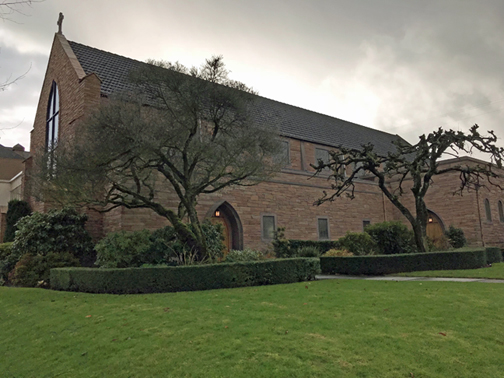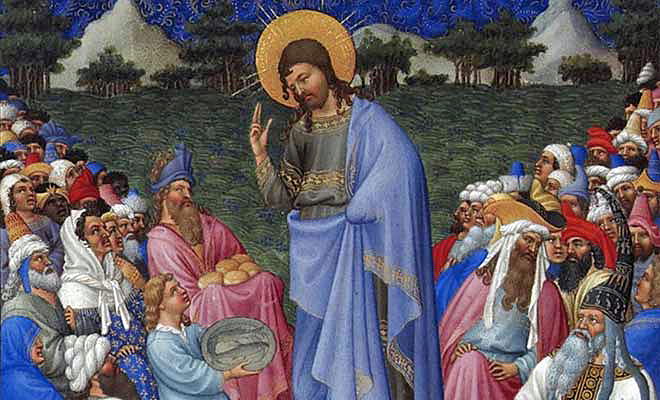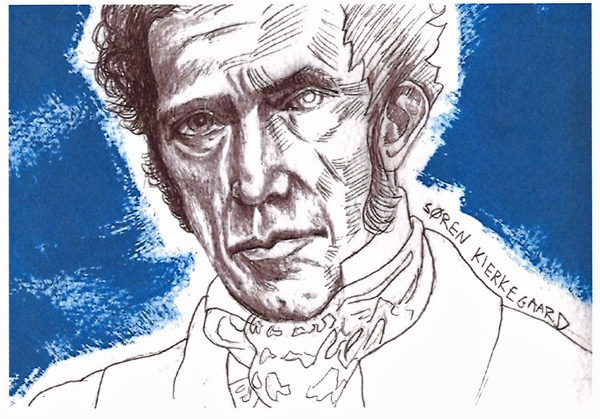|
February 2021
|
|
|
|
|

Judge Yourself
The ancient Greek philosopher, Plato, famously said that
we need to know ourselves (Phaedrus,
229e). The New Testament adds that we also need to judge
ourselves (1 Corinthians 11:31, 2 Corinthians 13:5–9).
The Bible teaches that we need to know how bad we really
are – “O wretched man that I am! Who will deliver me
from this body of death?” (Romans 7:24). Lent begins on
Ash Wednesday (February 17) and marks the beginning of a
special time each year for Christians to learn this
anew. Since we will not be gathering in our church
building this year for the Ash Wednesday liturgy and
imposition of ashes, an online examination will be
provided instead.
In preparation for that examination, prayerfully
consider this passage from
the Lutheran Confessions: “Original sin… replaces the
lost image of God in man with a deep, wicked,
abominable, bottomless, inscrutable, and inexpressible
corruption of his entire nature in all its powers,
especially of the highest and foremost powers of the
soul in mind, heart, and will. As a result, since the
Fall man inherits an inborn wicked stamp, an interior
uncleanness of the heart and evil desires and
inclinations” (The
Book of Concord,
ed. T. Tappert, p. 510).
—Pastor
Marshall
|
|
|
|
|
|
PRESIDENT'S REPORT....by
Cary Natiello
Hello
again First Lutheran Church members,
I was
not able to attend our annual meeting on January 31,
2021 because I traveled to Mexico with my wife to visit
her 92 year old mother who broke her hip and is slowly
recovering.
I hope that the meeting went well and that many of you
were able to attend.
It is also my hope that you felt united in the
decisions that were made at the meeting.
By the time you receive this issue of
The Messenger,
I will be back home and God willing, COVID free.
On Wednesday, January 20, I listened to the
inauguration speech that President Joe Biden gave,
speaking of unity and the need to help each other during
these trying times.
I wanted to share some of his speech that gave me
some hope for our future as a nation (not exact quotes,
but close enough I think)…
With unity we can do great things, important
things. We can
right wrongs.
Through civil war, the Great Depression, World
Wars, 9/11, through struggle, sacrifice, and setback,
our better angels
have always prevailed.
In each of our moments enough of us have come
together to carry all of us forward and we can do that
now. History,
faith and reason show the way…of unity.
We can see
each other not as adversaries but as
neighbors.
Without unity there is no peace, only bitterness
and fury, no progress, only exhausting outrage.
We must end this uncivil war that pits
red against blue, rural versus urban, conservative
versus liberal.
We can do this if we open our
souls instead
of hardening our hearts, if we show a little tolerance
and humility, and if we're willing to stand in the other
person's shoes.
Some days you need a hand.
There are other days when
we're called to
lend a hand. That's how it has to be, that's
what we do for
one another.
In the work ahead of us we're going to need each
other. We
need all our strength to persevere through this dark
winter.
We're entering what may be the darkest and deadliest
period of the virus.
We must set aside politics and finally face this
pandemic as one nation.
As the Bible says, “Weeping
may endure for a night, joy cometh in the morning.”
(Psalm
30:5).
We will get through this together.
My
prayer is that united we stand to help our neighbor, and
as a nation, it is what propels us to a better future
for all.
Blessing to you all.

|
|
|
|
|
|
Our Giving 2021
As we look forward to a new year we have some hope. The
hope of returning to worship in the building, the hope
that the pandemic and its ramifications will be greatly
reduced, and the hope that life as a whole will return
to some kind of predictable rhythm.
Giving to the church has dropped off in the last
few months and we have been encouraged to do what we can
to make up the difference. The ELCA’s Generosity Project
asks us to consider some important questions as we think
about being the best stewards we can of what we have in
our individual households. So let’s take a look at some
factors involved with stewardship during such
unpredictable times.
First, do our households know how much we share
and give of our time, possessions and wealth? Does each
person in the family have the same idea of how to share
and give? Children learn by the examples they see at
home. The WHY of giving is because it is good to
do so, and we are given that example through Christ’s
life.
Next, try to recall when you have been the
recipients of generosity. Whose generosity are you most
thankful for?
Does the giving of others inspire us to be more
generous? In the feeding of the 5,000, those afterward
marveled, believing that Jesus, “Must be the Prophet who
is come into the world!” (John 6:14)
So, the WHO of giving is important to consider
with Christ again being our best example.
Then there is the WHERE we practice our
generosity. Do we support First Lutheran Church with the
first fruits of our generosity?
Do we support other organizations, besides those in our
own extended ministries? Perhaps we can ask God to equip
us and help us recommit to supporting First Lutheran
Church with our first fruits, while still participating
in other worthy ministries.
The HOW of giving is also worthy of
consideration. Weekly or monthly pledged support of the
church is one way. The St. Nicholas Faire is an
entertaining and fun way of giving and helps us to
responsibly live in our community. Our skills and
talents can also be used to give in the various ways we
can, e.g. carpentry, financial skills, healthcare,
music, etc. Our church is multitalented!
Then there is the HERE & NOW. This involves times
when we felt unusually generous and led by God to
do more or give more. Asking God to make us aware of how
we can be open to giving and sharing unexpectedly is a
worthy prayer. This will allow us to be stretched and
used by God in different ways.
-Benjamin Dobbeck,
Church Council

|
|
|
|
|
|

Luther on Ruth
By Pastor Marshall
After
Ruth’s husband, Mahlon, dies, Naomi tells her she is
free to return to Moab. But Ruth famously refuses,
saying, “where you go I will go, your people shall be my
people, and your God my God” (Ruth 1:16). Luther saw in
Ruth’s confession a break from Judaism, for “although
she did not belong to the holy people – for she was a
Moabitess – she was nevertheless saved because she clung
in faith to the God of Israel” (Luther’s
Works 3:133). With her abiding faith, Ruth could say
to Naomi that “even though I am not of your people, your
God will not cast me aside [but] will take care of me” (LW
2:276). Others see in this “no miracle, no heady
manifestation of God’s power, no fanfare,…. no
conversion” on Ruth’s part (E. F. Campbell,
Ruth, 1975,
p. 82). But others see Ruth’s faith as “a deliberate
choice [giving up] the traditional Moabite deity Chemosh”
– being a radical move “even more memorable than
Abraham’s for she acts without a specific revelation
from God” (K. D. Sakenfeld,
Ruth, 1999,
p. 33). Indeed, “Ruth’s renunciation foreshadows Jesus’
teaching: to be his disciple requires one to renounce
all family ties for the sake of the kingdom of God” (R.
L. Hubbard, The
Book of Ruth, 1988, p. 118). Hers is a “costly
decision” (E. J. Hamlin,
Ruth: Surely
There is a Future, 1996, p. 20). It “rejects common
sense and any shred of self-interest” (C. C. James,
Finding God in the Margins: The Book of Ruth, 2018,
p. 43). “Ruth goes over Naomi’s head by appealing to
[her] God – the God Naomi has just identified as the
enemy [Ruth 1:13]” (C. C. James,
The Gospel of
Ruth, 2008, p. 48). Luther would like Ruth’s daring
disposition – believing that all Christians should be
rebels (LW
13:414).
|
|
|
|
|
|

Philippians
The Apostle Saint Paul
“I press on to make it my own, because
Christ Jesus has made me his own.”
(3:12)
by Pastor Marshall
Martin
Luther sees the contrast in this verse between
make and
made to be
one by which we “toil and exert ourselves that we may
finally comprehend… the incomprehensible glory [of our
salvation]… as we have been comprehended” by it. And we
do that with “a weak faith,” knowing “the consolation
that God [welcomes the one] who is weak in faith (Romans
14:1).” So we keep on toiling and exerting even though
those efforts are “a slender grasping and a tiny spark
of faith” (Luther’s
Works
5:230–231) – and we know that “this does not happen in
peace and calm rest, for it is a battle which does not
end without wounds and blood” (LW
76:284). But we keep on toiling for we want the
“fullness” of faith, in order to grasp Christ “more
certainly, and not to doubt” him (LW
12:359) – “that I may see what good things have been put
into the shrine of faith” (LW
75:237). For indeed, “whoever has begun to be a
Christian, this is what remains: to consider that he has
not yet become a Christian and to seek to become a
Christian” (LW
67:213).
That’s because we’re mixed and need purifying.
For “filth always wants to sit in the heart alongside
where Christ should be seated, and it wants to defile
His seat” (LW
57:108). What’s in us that “belongs to faith and to
Christ is completely pure,... but what is still our own
is completely sinful” (LW
21:205). So we have a lot to do. And no one is a “master
of this art, but we all remain disciples” (LW
12:407). Disciples know that this struggle is like going
after “a wonderful taste or odor that they greatly
desire and pursue; and they are amazed that they cannot
grasp it or comprehend it as they would like” (LW
14:37). But we do not give up – keeping on “doing good
works, fulfilling your station or office diligently and
faithfully, and undergoing all sorts of suffering for
the Gospel” (LW
21:205). These efforts matter because “in this life we
shall never learn all there is to know” (LW
58:451). And without them the disciple “stops growing,
that is, starts declining” (LW
25:153).
And
how has God already made us his own? He “released us
from sin; he bestowed power on us, strength to exercise
virtue; he bestowed on us readiness, patience; at our
baptism he bestowed on us the Holy Spirit” (John
Chrysostom,
Homilies on Philippians, trans. P. Allen, 2013, p.
245). Struggling to affirm and build upon these
endowments is the “true nature of Christian existence on
earth” – a struggle that brings us “nearer the goal, but
so long as [we are] in the body, that goal still lies
ahead” (F. F. Bruce,
Philippians,
1989, p. 120). This struggle will fail without “deep
fervor” (B. Thurston,
Philippians,
2009, p. 130). That fervor enables “running, wrestling,
striving, and fighting.” The struggling disciple “can
seek, because he has been found; he can know because he
has been known; he can apprehend because he has been
apprehended.” These struggles oppose the “smiling
presentations of the gospel as the way to be healthy,
wealthy, and wise” because they insult those “who wish
to be taken more seriously than that” (Fred Craddock,
Philippians,
1985, pp. 61–62). For that true struggle “the active
response to grace is gratitude, to mercy is repentance,
and to love [the] resolve to love in return” (G.
Hunsinger,
Philippians, 2020, p. 114). Knowing this, however,
can be “a terrible void.” That’s because the struggle is
unending – and gratitude, repentance, and love can wane.
So the endowments have to be primary. That God has first
made us his own is the “substance, fullness, possession,
joy, [and] assurance” of our life with him (Karl Barth,
Epistle to the
Philippians, 40th Anniversary Edition, trans. J. W.
Leitch, 2002, p. 108).
|
|
|
|
|
|

Thinking About Kierkegaard
Søren Kierkegaard (1813–1855) “is widely considered the
most important religious thinker of the modern age”
(Peter E. Gordon, “Kierkegaard’s Rebellion,” The New
York Review of Books, November 10, 2016) He
published over twenty-five books in his short life, as
well as a seven volume journal after his death. That
massive collection of notes and papers has been called The
Soul of Kierkegaard (Dover Press, 2003). In it he
writes from 1853 that Christianity gone awry – he calls
it “Christian wilting” – mistakes “the artistic for the
Christian, human upbringing for Christian character,
human cleverness for Christian recklessness, human
superiority for Christian worth, the charming
magnificence of appearance for the plain everyday dress
of truth, a secular, not to say pagan,
Sunday-Christianity for New Testament
Monday-Christianity; it mistakes artistic seriousness in
playing Christianity for the real earnestness of
Christianity, the idyllic enjoyment of quiet hours for
New Testament painful decision; it mistakes enjoyment
for suffering, winning the world for renunciation of the
world, heightening life’s enjoyment for painfully dying
to the world…” (Journals, ed. Hongs, §1:825).
What follows is an attempt to think through this
passage, nearly phrase by phase, to enhance our
appreciation of it.
Jane Harty:
Is Kierkegaard criticizing sacred classical music
masterpieces, rich liturgical vestments and paraments,
beautiful stained glass, and awe-inspiring architecture
(in other words, the “artistic”) as distractions away
from authentic Christianity?
Ron Marshall:
Yes, but only if they indeed distract Christians from
suffering for Christ and following him (Kierkegaard’s
Writings 20:255–57). Most of the time he thinks art
does that because it favors enjoyment over the struggle
that comes from wrestling with the truth (Journals
§2:1823). In that sense he thinks that beauty and
eloquence are dangerous for the church (Journal
§1:818). They provide a respite from the troubles of
ordinary, daily living (KW 17:165, Journals
§6:6957) which is the difficulty we need if we’re to be
drawn more closely into Christ (KW 15:292). Just
think how the church favors soothing, melodious music
over discordant, harsh pieces; and sculpture with
serpentine lines over angular, random, sharp edge
protrusions.
Jane 2:
What is the essential difference between what
Kierkegaard calls “human upbringing” and “Christian
character?”
Ron 2:
Human upbringing has to do with gradual improvements
designed to help us fit into society (Journals
§5:6076). Christians should instead stand outside of
society as critics heralding Christ’s different way of
life (Journals §4:4175).
Jane 3:
What is “Christian recklessness?” Is that the leap of
faith?
Ron 3: Yes
and more. He did indeed call faith that “rashly risked
venture” which leaned toward “foolhardiness” (Journals §2:1438).
But he also thought that the daily Christian life was
marked by confrontations with opponents over personal
convictions and broad social trends and norms (Journals §5:5049).
Jane 4:
Isn’t “Christian worth” also about some kind of
“superiority” of character, in comparison to those of
other faiths?
Ron 4:
Yes, if it were actually possible for Christians to live
Christian lives. But Kierkegaard believed that
Christians could only aspire to such a life – and not
actually live it. (KW 22:139–41). So while he
thought that the Christian ideal was the best (Journals §6:6843,
p. 484), he didn’t believe that any Christian’s life was
better than anyone else’s. Personal humility mattered
deeply to him (KW 21:77).
Jane 5:
The “magnificence of appearance” and “plain truth” are
contrasted. Can’t the truth also be magnificent?
Ron 5: Truth
wasn’t primarily theoretical for Kierkegaard. That
complexity could look magnificent. But living a truthful
life mattered more – which for him was about imitating
or following Christ (Journals §2:1905).
Jane 6:
Can you explain the difference between “secular, not to
say pagan, Sunday-Christianity” and “New Testament
Monday-Christianity?”
Ron 6:
Kierkegaard worried about Sunday worship being
dead-ended. He wanted to make sure that after worship
was over, the Christian would struggle to try to become
a better follower of Jesus. He told a parable about
this, comparing people to worshipping geese who never
cared to change and weren’t worried about it (Journals
§3:3067).
Jane 7:
Can “artistic seriousness” and the “earnestness of
Christianity” work together? In our time, the term
“chancel prancing” has been invoked, but isn’t that just
name-calling?
Ron 7:
For Kierkegaard Christian earnestness had more to do
with struggling with faith and people than struggling
with inanimate objects as in the plastic arts – that is,
paintings, sculpture and architecture. He thought the
same could happen in human art forms (music and dance)
but not as clearly. An example of disregard for
Christian earnestness in musical art would be the
exposé Mozart in the Jungle: Sex, Drugs, and
Classical Music (2005) by Blair Tindall.
Jane 8:
Can you give an example of musical art that does not
disregard Christian earnestness? For example, does it
count that J. S. Bach signed his sacred music scores
with Soli Deo Gloria, or is that superficial?
What about composers that don’t identify as Christians
but use Christian texts, for example John Rutter? Or
instrumental music without texts that expresses both
sorrow and joy in a deeply felt, serious way, like
Beethoven or Chopin? What counts for Christian
earnestness in art and music for Kierkegaard?
Ron 8: Kierkegaard
didn’t write a treatise on faith and art. All that we
have are pieces here and there about it in his writings.
We do know, however, that he thought Mozart’s opera, Don
Giovanni, had Christian importance as a warning
against rampant sensuality (Journals §3:2789).
Because of that he said he owed everything to Mozart (Journals §3:2791).
Jane 9: What
is the “painful New Testament decision” that Kierkegaard
refers to? Is that again the “leap of faith” and if so,
why is it painful?
Ron 9: No,
it has more to do with hating yourself, dying to
yourself, denying yourself and losing your life for
Christ’s sake (Journals §§3:3771, 33781). All of
them take a toll on one’s self-esteem. And that causes
psychological pain.
Jane 10: How
can one mistake “enjoyment” for “suffering?” Isn’t that
just masochism?
Ron 10: It’s
actually about a blatant falsification and replacement
that you wouldn’t think would work, since it’s so coarse
and obvious. But it has. So rather than enjoying
suffering, Kierkegaard’s point is that suffering has
been eliminated and replaced with enjoying life’s
pleasantries (KW 21:22–24). He thought that this
was a huge mistake and that very few in the church cared
about it (KW 23:129–37).
Jane 11: “Winning
the world” is contrasted with “renunciation of the
world.” But we are not called to hide ourselves away in
monasteries or convents, correct? Don’t we have to fight
for the oppressed in the world, to win justice for them?
Ron 11: Yes,
Kierkegaard cared about helping the needy (KW 16:315–30).
But he didn’t think we could win the world over by doing
so. For even when we successfully help people, the world
remains a “vale of tears” (Journals §§2:1439,
4:5031).
Jane 12: Just
to put a fine point on it, for Kierkegaard we should try
to help people not because it will make any difference
in this “vale of tears,” but simply out of obedience –
is that correct? Would Kierkegaard recognize that there
is some Christian joy in service, that the work
(including his own) is its own reward?
Ron 12: No,
showing mercy makes a difference to the one being
helped. But it will not win over the world – making it a
merciful place overall.
Jane 13: Is
“painfully dying to the world” a criticism of the
American right to the “pursuit of happiness?”
Ron 13: Yes.
Kierkegaard didn’t think that superficial happiness in
material things and cheap relationships was Christian.
He thought Christian happiness was joy saturated with
sorrow (Journals §3:2908). He also thought that
joy is mostly rooted in heaven after we die and live
again in eternity (Journals §3:3098).
Jane 14: As
American Christians (a very large and conflicted group),
how do we honor Kierkegaard’s legacy in practical ways,
or should we just dismiss it as criticism of the 19th
century Danish Lutheran Church?
Ron 14: I
think Kierkegaard’s practical legacy for our time is his
handy summary from 1851 – “Infinite humiliation and
grace, and then a striving born of gratitude – this is
Christianity” (Journals §1:993).
|
|
|
|
|
|
_edited-1.jpg)
The Presentation
of Our Lord —
Tuesday, February 2nd
“The divine Word is opposed by
all the factions…. For Christ must be a target or
sign to be spoken against, as it is written in Luke
2:34, and yet He is also a precious sign. Thus the
Church of God was also one and singular from the
beginning, and yet she was in great turmoil, for she had
a clear and singular doctrine. Nevertheless, they all
lie in wait for us…. There is all this ranting and
raving against us, and they are madly furious at us.
This is the ‘dwelling,’ as the psalm says, ‘among your
enemies’ (Psalm 110:2). The flock that truly has God’s
Word must suffer, but the
others… they can tolerate.”
(Luther’s
Works
68:265)
|
|
|
|
|
|
Job 9:12
Monthly Home Bible Study,
February 2021, Number
336
The Reverend Ronald F. Marshall
Along with our other regular study of Scripture, let us
join as a congregation in this home study. We will
study alone
then talk informally about the assigned verses together
as we have opportunity. In this way we can “gather
together
around the Word” even though physically we will not be
getting together (Acts 13.44). (This study uses the RSV
translation.)
We need to support each other in this difficult
project. In 1851 Kierkegaard wrote that the Bible is “an
extremely dangerous book.... [because] it is an
imperious book... – it takes the whole man and may
suddenly and radically change... life on a prodigious
scale” (For
Self-Examination). And in 1967 Thomas Merton wrote
that “we all instinctively know that it is dangerous to
become involved in the Bible” (Opening
the Bible). Indeed this word “kills” us (Hosea 6.5)
because we are “a rebellious people” (Isaiah 30.9)! As
Lutherans, however, we are still to “abide in the womb
of the Word” (Luther's
Works 17.93) by constantly “ruminating on the Word”
(LW 30.219)
so that we may “become like the Word” (LW
29.155) by thinking “in the way Scripture does” (LW
25.261). Before you study then, pray: “Blessed Lord, who
caused all Holy Scriptures to be written for our
learning: Grant us so to hear them, read, mark, learn
and inwardly digest them, that we may embrace and ever
hold fast the blessed hope of everlasting life, which
you have given us in Our Savior Jesus Christ. Amen”
(quoted in R. F. Marshall,
Making A New
World: How Lutherans Read the Bible, 2003, p. 12).
And don’t give up, for as Luther said, we “have in
Scripture enough to study for all eternity” (LW
75:422)!
Week I.
Read Job 9.12 noting the question
Who can hinder God? What does this say about God? On
this read Psalm 115.3 noting the line
God… does
whatever he pleases. How is that possible? On this
read Genesis 18.14 noting the rhetorical question
Is anything too
hard for the Lord? Read also Luke 18.27 noting the
claim that what
is impossible with men is possible with God. Does
this restrict God’s power to the range of human
possibilities? Check out Luke 1.37 noting the line that
nothing will be
impossible with God. Why does Job concede this
unlimited power to God? Does he have any choice? On this
read Psalm 62.11 noting the claim that
power belongs to
God. What’s the issue here? On this read Psalm 78.65
about God awaking
as from sleep. Does that mean it looks like God is
asleep at the switch and doesn’t exercise controlling
power? Psalm 10.13 reports the wicked saying that God
can’t catch them. How shall we respond? Read Psalm 10.15
on begging God to
break their arms. Is that a good prayer?
Week II.
Read again Job 9.12 noting this time the word
snatches. What does God take away? On this read
Psalm 139.10 noting the words
lead
and hold. How
controlling are those words? Check out Jeremiah 18.6
noting the words
potter, clay
and hand. If
God has this same kind of complete control over us, are
we free at all to resist God and act contrary to his
will for us? On this read Genesis 6.5–6 noting the words
saw,
wickedness,
only,
every,
evil,
sorry and
grieved. Does
this sound like the people acted contrary to God’s
wishes? But check out also Romans 9.18 noting the words
mercy,
hardens and
wills. Is God
back in control in this verse? Read also Matthew 10.29
noting the words
sparrows,
fall and will.
Is the same thorough control in this verse? Or is there
some sort of combination? On this read Philippians
2.12–13 noting the three uses of the word
work, and
also the words
obeyed, will
and for. How
do the beloved and God work together in these two
verses?
Week III.
Reread Job 9.12 noting this time the word
say. Are we to talk back to God? On this read Romans
9.20 noting the words
man,
God and
why. Why
aren’t people to argue with God? On this read Isaiah
55.8–9 noting the words
thought,
ways,
not and
higher. How
much of a disadvantage is this for us? Check out Luke
11.28 noting the words
hear and
keep. Is this
strict obedience? If it is, then there isn’t any freedom
to go over with God things we disagree about. On this
read Job 40.4 noting the confession
I am of small
account. What sort of a place is that before God?
Check out Job 40.7 noting the contrast between
question and
declare. Why
can’t we question God? Read further on to Job 40.9
noting the words
thunder and
voice. We can explode nuclear bombs and amplify our
speech, but what if our natural voices cannot simulate
thunder? Does that prevent us from questioning God? Read
Numbers 16.32 noting the words
ground,
opened,
swallowed and
all. Why
can’t we duplicate an earthquake? Is it just a matter of
time, waiting for the right inventions and technology?
Week IV.
Read Job 9.12 one last time noting the same word
say. If
questioning God is not the way to go, what is? On this
read Isaiah 43.21 noting the line
I formed… people
[to] declare my praise. Why is praising God better
than questioning him? What position does worship put us
in before God? On this read Hebrews 12.28–29 noting the
words grateful,
shaken,
awe,
consuming and
fire. How
does knowing that God’s kingdom cannot be shaken change
the way we speak before God? Read Isaiah 6.1–5 noting
the exclamation
Woe is me! Read also Revelation 1.17 noting the line
I fell at his
feet as though dead. Why is this demeaning stance
fitting for worship? On this read John 3.30 noting the
contrasting words
increase and
decrease. Why is this inequality fitting? Check out
Romans 1.25 noting the line
they… worshipped
and served the creature rather than the Creator.
Where’s the mistake in this? On this read 2 Corinthians
4.18 noting the contrast between the
transient and
the eternal.
The mistake is
looking to the transient instead of the unseen
eternal. Do you agree? Does John 9.39 with its contrast
between seeing
and not seeing help? Why or why not?
|
|
|
|
|
|
ANNOUNCEMENTS:
flcws.org:
The
church's webpage is easily found at
www.flcws.org
— or if you have a cell phone you might enjoy using
www.flcws.space.
At the
moment our webpage is even more important with our
Online Worship
pages on Sundays.
Considering we may have a little more time these
days, it’s a good time to check out what we might have
overlooked before.
Our web page is a good introduction to our
church.
PASTOR MARSHALL’s
next ZOOM online Koran Class starts on Monday, March 1st
and continues through Monday the 22nd.
Call the office if you would like to be sent a
link.
Home Communion
is available to the congregation on request.
“With the Mind”
Zoom online book discussion
(J. M. Coetzee,
The Schooldays of
Jesus: A Novel, 2016),
is planned for Sunday, March 14 at 3:30 pm.
Please contact Pastor Marshall by email or phone
to be sent a link to join the discussion group.
Postage
for the home delivery of The Messenger is donated
by JohnsonCN — Computer
Support for Business and Non-Profits -
www.johnsoncn.com.

|
|
|
|
|
|
 PARISH PRAYERS
PARISH PRAYERS

Remember in prayer before God those whom He has made
your
brothers and sisters through baptism.
Beyla Tuomi,
Leah, Melissa Baker and Felicia Wells, Dorothy Ryder, Melanie
Johnson, Sam & Nancy Lawson, Marlis Ormiston, Connor
Bisticas, Eileen & Dave Nestoss, Kyra Stromberg, Bob
Schorn, Kari
Meier,
Angel Lynn, Tabitha Anderson, The Rev. Albin Fogelquist,
The Rev. Howard Fosser, The Rev. Kari Reiten, The Rev.
Dan Peterson, The Rev. Alan Gardner, Heather Tutuska,
Sheila Feichtner, Leslie Hicks, Yuriko Nishimura, Eric
Baxter, Evelyn, Emily & Gordon Wilhelm, Garrett Metzler,
Noel Curtis,
Antonio Ortez, Garrison Radcliffe, Richard
Patishnock, Jeff Hancock, Anthony Brisbane, Holly &
Terrance Finan, Wayne & Chris Korsmo, Ty Wick, Lori
Aarstad, Dona Brost, Susan Curry, Geri Zerr, Karin Weyer,
Robert Shull family, Alan Morgan family, Carolyn & Marv
Morris, Lucy Shearer, Wayne Ducheneaux, Julie Godinez,
Joey DiJulio and family, Ramona King, Karen Berg,
Christine Berg, Patty Johnson, Donna & Grover Mullen and
family, Erin, Ethan & Kevin Vodka, Kurt Weigel.
Pray for our professional Health Care Providers:
Gina Allen, Janine Douglass, David Juhl, Dana Kahn, Dean
Riskedahl, Jane Collins
and
all those suffering from the coronavirus pandemic.
Pray for
unbelievers, the addicted, the sexually abused and
harassed, the homeless, the hungry and the unemployed.
Pray for the shut-ins that the light of Christ
may give them joy:
Bob & Mona Ayer, Joan Olson, Bob Schorn, Doris
Prescott, C.J. Christian, Dorothy Ryder, Crystal Tudor,
Gregg & Jeannine Lingle, Nora Vanhala, Martin Nygaard,
Anelma Meeks.
Pray for those mourning over death:
Pray that God will bear their grief and lift
their hearts:
Pray for the family and friends of Carl Schalk,
The Rev. Dave Monson, Marie Magenta, Chiou-Jin Chen.
Pray for our bishops Elizabeth Eaton and Shelley
Bryan Wee, our pastor Ronald Marshall, our choirmaster
Dean Hard and our cantor Andrew King, that they may be
strengthened in faith, love and the holy office to which
they have been called.
Pray that God would give us hearts which find joy
in service and in celebration of Stewardship.
Pray that God would work within you to become a
good steward of your time, your talents and finances.
Pray to strengthen the Stewardship of our
congregation in these same ways.
Pray for the hungry, ignored, abused, and
homeless this February. Pray for the mercy of God for
these people, and for all in Christ's church to see and
help those who are in distress.
Pray for our sister congregation:
El Camino de Emmaus in the Skagit Valley that God
may bless and strengthen their ministry.
Also, pray for our parish and it's ministry.
Pray that God will bless you through the lives of
the saints: Martin Luther, Renewer of the Church, 1546;
Saint Matthias, Apostle.
|
|
Treasury of Prayer
O Lord
my God, get me ready for the Day of Judgment. Reveal
yourself as my judge so that I may not be at ease when
the world thinks well of me, nor dismayed when it
doesn’t. Help me die to my own desires that I may arise
to newness of life. In the name of Christ I pray. Amen.
[For
All the Saints (ALPB, 1994-1996) 4 vols., IV:1297,
altered]
|
|
|